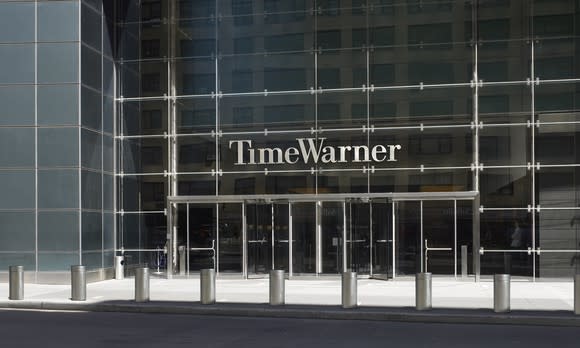Here's Why Nobody Cares About Time Warner’s Earnings
Time Warner Inc. (NYSE: TWX) ended 2017 with a bang. On the back of strong subscriber growth from its premium HBO property, the television and film giant beat expectations by posting fourth-quarter revenue of $8.61 billion versus estimates of $8.42 billion. The company soundly beat the consensus adjusted EPS estimate, too, reporting $2.66, 85% higher than the $1.44 analysts expected.
Time Warner also gave positive guidance for 2018, expecting adjusted operating income growth to be in the high single digits this year. Naturally, you'd expect shares to rally in response to Time Warner's blowout quarter. And you'd be mostly wrong: Shares increased less than 2% on the day of the announcement.
Here's why nobody cares about Time Warner's great quarter.

Image source: Time Warner Inc.
Widespread growth for Time Warner
Time Warner's success was widespread in the fourth quarter. The company's ad-supported Turner division -- which includes TNT, TBS, and CNN (more on CNN later) -- grew revenue 10% over the prior year's period. While advertising revenue continues to flounder, only up 2%, subscriber revenue increased 14% while content for streaming revenue deals rose 32%. Time Warner was able to turn 10% revenue growth into 22% operating income in the quarter.
The company's HBO division increased revenue 13% because of hits such as Game of Thrones and a strategy to trade rate increases for more customers. This strategy is working in HBO's direct-to-consumer options such as HBO Now. The company reported 5 million subscriptions in the United States, approximately 150% more than the 2 million the company disclosed in February 2017. Operating income in the division also increased 13% over last year's quarter.
It was a mixed bag for Time Warner's Warner Bros. studios. Revenue attributable to the segment increased by 5%, although operating income fell 10% in the segment in the fourth quarter. Full-year revenue and operating income improved for all segments.
Waiting for the government
For Time Warner, the Justice Department is affecting its stock more than its Justice League movie is. Last year, the company agreed to be acquired by AT&T (NYSE: T) for $85 billion. Initially the deal was expected to gain DOJ approval quickly, as it was mostly a vertical merger and the federal government typically concerns itself with horizontal mergers, which decrease competition. In addition, there's precedent for the approval of horizontal mergers of delivery and content -- most notably Comcast's purchase of NBCUniversal in 2011.
Therefore, it was slightly surprising when the Trump administration challenged the merger. It was even more surprising when Politico reported in November that CNN -- which Trump lambastes as a source of "fake news" -- was allegedly the sticking point in the deal's approval, and that a sale of CNN might be required before the deal could occur.
Now it appears the federal government is powering up to litigate the case on antitrust grounds. Two days before Time Warner's earnings announcement, it was reported that the federal government was close to securing a well-regarded economics professor to challenge the merger.
Even though AT&T and Time Warner have extended the merger deadlines, look for a long and protracted battle. AT&T released a strongly worded statement upon notification the deal would be challenged: "Today's DOJ lawsuit is a radical and inexplicable departure from decades of antitrust precedent." On AT&T's recent earnings call, CEO Randall Stephenson was more succinct" "On the Time Warner front, we look forward to presenting our case in court and closing the deal."
With the threat of protracted legal battles, merger uncertainly, and a well-defined takeout price (if successful), it's understandable why investors are not more bullish on Time Warner's results.
More From The Motley Fool
Jamal Carnette, CFA owns shares of AT&T.; The Motley Fool recommends Time Warner. The Motley Fool has a disclosure policy.
